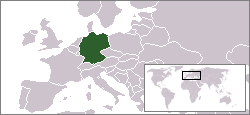| Germany | |||
 | |||
Location  | |||
Weapon & Flag
| |||
| Capital | Berlin | ||
|---|---|---|---|
| Government | Federal Republic | ||
| Currency | Euro | ||
| Surface | 357,021 | ||
| Population | 80,925,000 | ||
| Language | German | ||
| Religions | Roman Catholic and Evangelical Lutheran (official) | ||
| Area code | 49 | ||
| TLD | .the | ||
| Time zones | UTC 1 | ||
| Website | https://www.deutschland.de/en | ||
Germany (German Deutschland) is a country in Central Europe.
Planning before the trip
As Germany and Sweden are members of Schengen, neither a visa nor a passport are required to travel to Germany from Sweden.
To take with you to Germany
To bring with you from Germany
Facts about Germany
Germany is the second largest country in terms of population Europe (after Russia) and is located in the middle of the continent. Germany is a member of the EU and borders Denmark, Netherlands, Belgium, Luxembourg, France, Switzerland, Austria, Czech Republic, and Poland.
History
The formation of the German Empire in 1871 is seen as the basis for modern Germany. Previously, the central parts of Europe had been divided into microstates, but now they were united under Otto von Bismarck. After the country's lost First World War, the empire was dissolved and parliamentarism was introduced. However, this became short-lived with the rise of Nazism and took power during the 20s and 30s, which later led to the Second World War. After Nazi Germany lost the war, the country is divided into two parts, West and East Germany. In 1961, the Berlin Wall was built, which cemented the division between East and West. It took until 1990 before the country could be reunited.
The locals
Most Germans are helpful and nice to tourists. Although most people do not know English fluently, they usually try their best, but of course it is good if you can start with a few phrases in German. Old people usually can not speak English, but it happens. German is spoken by more people as a mother tongue than both French and English in Europe. Most people in Germany have a positive attitude towards Sweden, so it can be an advantage to emphasize that you are Swedish. Astrid Lindgren, ABBA, Ingmar Bergman, Zarah Leander, Swedish writers, actors such as Ingrid Bergman and Greta Garbo and others. are familiar in Germany, Switzerland and Austria. The Beck and Wallander films are popular, as are all Astrid Lindgren films.
World War II and National Socialism are very sensitive topics in Germany, which means that many engage with Germans and perceive them as cold and harsh, which is not correct.
Climate
In summer, the temperature can occasionally be well over 30 degrees. In winter the temperature is between a few degrees below zero and 5 degrees, in southern Germany it is colder. Germany thus has a mainland climate.
Holidays
In addition to the national day on October 3, the same holidays are celebrated as in Europe (Easter, Christmas and New Year).
Regions

Germany is a federal republic that is divided into a number of states or federal states:
Cities
Getting to Germany
By plane
There are a large number of international airports in Germany, the largest in Frankfurt, Berlin, Munich, Hamburg and Düsseldorf.
By train
You can get to Germany by train from all neighboring countries.
By boat
_in_Trelleborg_001.jpg/220px-Sassnitz_(Scandlines)_in_Trelleborg_001.jpg)
From i.a. Sweden, Denmark and Finland you can go to Germany by ferry.
With car
Many tourists come to Germany by car, either to stay there or they are in transit. As Germany is located in the middle of Europe, many people drive through the country.
Relocation in Germany
The train [1] takes care of train traffic in Germany. Trains are the best option to move around if you are not moving by car.
The German motorway (Autobahn) is known for being able to drive as fast as you want on many stretches. Nevertheless, it is still safe to drive there.
Payment

Germany is a fairly cheap country to live in, compared to the other Western European countries. Prices in Germany correspond to approximately 80-85% of prices in Sweden. Examples of everyday costs are an overnight stay in a hotel costs an average of € 50, eating out costs around € 7, a liter of petrol is € 1.5 and a bus or metro ticket costs just over € 1.5.
The euro is the official currency of Germany.
Accommodation
Food and drinks
- German beer and bratwurst are world famous. In addition, there is a huge range of local specialties such as the well-known Currywurst which is found in almost every street corner in e.g. Berlin.
To see



